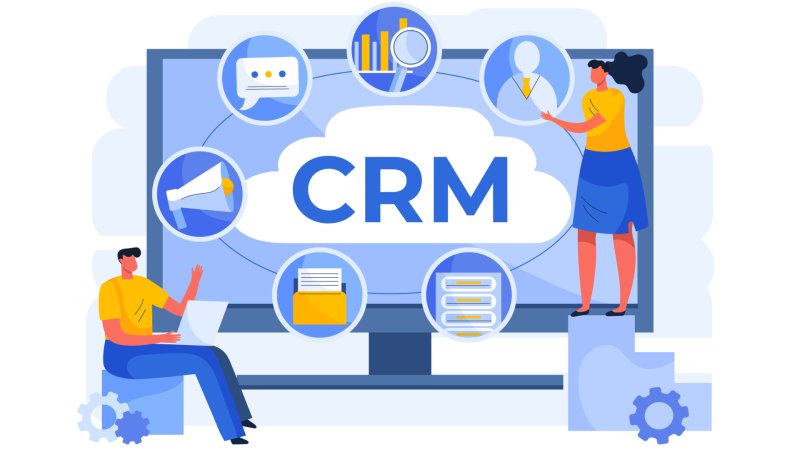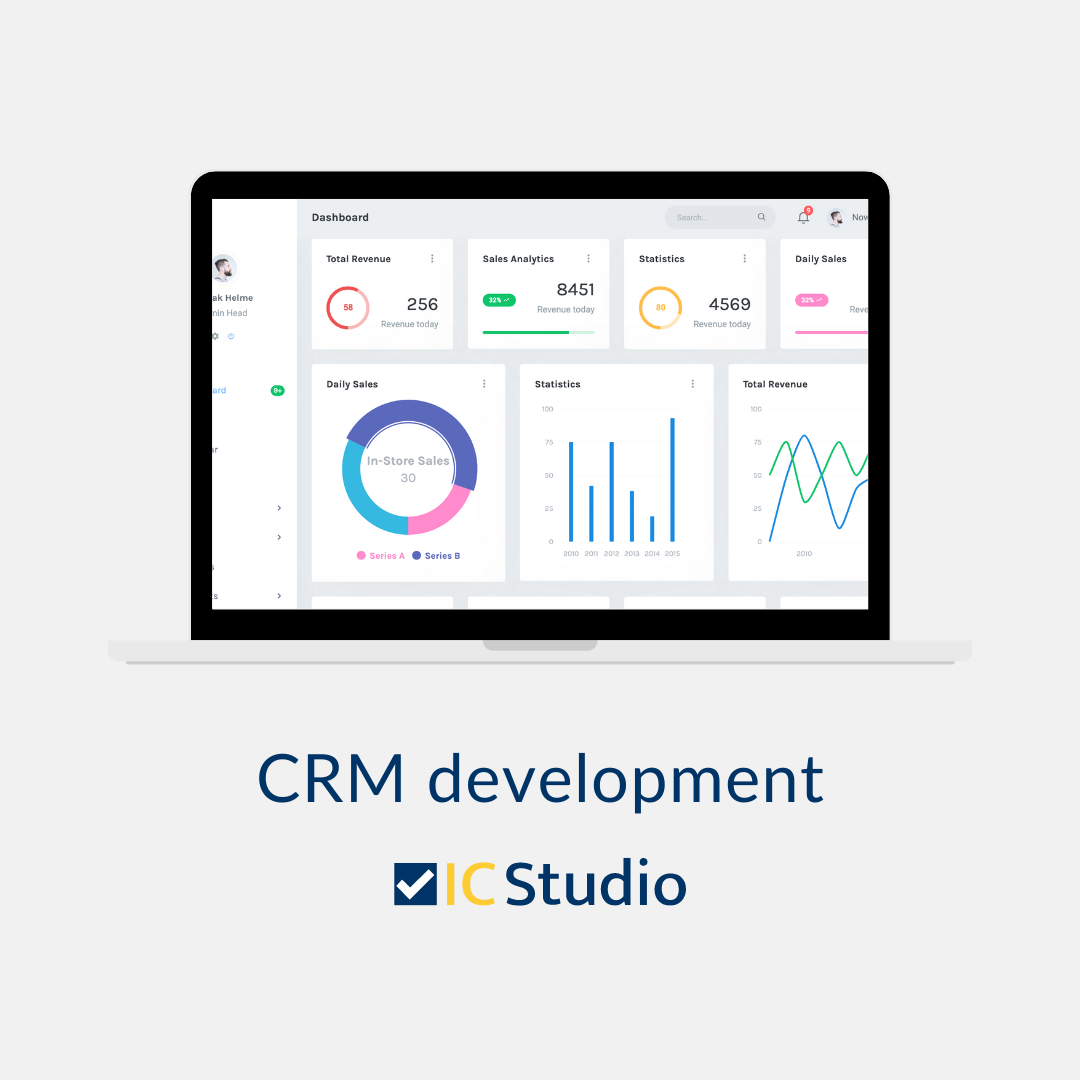
Development of CRM for the sales department
The sales department is the key department that feeds the company, along with the marketing department.
Business efficiency directly depends on how smoothly the sales and marketing departments work, how correctly the business digitizes sales and interprets the results in the context of realized marketing strategies.
The thoughtfulness and flexibility of the ecosystem in which salespeople work affects not only the quality of workflow organization and the quality of interaction with customers, but also the quality of decision-making by the sales manager or commercial director.
Why do you need a CRM for the sales department?
CRM (Customer Relationship Management) was originally designed to manage customer relationships.
However, customer relationships are the tip of the iceberg, because a well-configured CRM allows you to control the work of salespeople, analyze key sales metrics, manage the team's workload, and monitor the effectiveness of the efforts made in the context of implementing various marketing strategies.
Useful features of a CRM system for the sales department
A CRM system is a powerful and flexible sales management tool that helps not only to automate part of the processes, but also to digitize sales, establish interaction with customers, and improve marketing strategies.
The first thing a company creates and implements a CRM system for in the sales department is to measure the sales funnel.
1. Sales funnel
Sales funnel measurements help a company to improve customer interactions during the pre-sales, sales and post-sales cycles.
Competently built sales funnels enable a company to digitize indicators for the sales funnel of current customers, the funnel of repeat purchases, the sales funnel by channel of customer attraction, the funnel by target audience segment, the sales funnel by individual manager, and so on.
All this data in the hands of the manager helps to make decisions about the strategy of working with each individual group of customer and increase not only the sales of the company, but also the quality of work with the client base.
One of the key objectives of the sales funnel, in addition to digitizing sales and analytics, is to reduce the sales cycle.
The sales cycle can be reduced by creating a precise business process structure, automating part of the processes and templating routines.

2. Unified environment for working with the client
The more channels of communication with the client we integrate into the sales department CRM, the more data about the history of work with the client we can accumulate, process and use to implement sales analytics, and make decisions about strategies to work with our clients.
Make sure your managers have an environment where they can:
- Make calls to customers and receive incoming calls, with the ability to go back and replay the recording of the call, if necessary;
- write and send an e-mail and get a response, which will be saved in the history of communication in the client card;
- write to the client in a messenger and be able to receive a response from the client, saving it in the history of dialogue;
- to form and sign a cooperation agreement;
- to issue invoices and see information about their payment;
- measure their activity and see which actions increase their efficiency and which ones slow down the results.
3. Unified environment for working with the team
The ability to organize the work of the team more effectively - one of the basic tasks of modern CRM systems.
Assigning tasks, meetings and calls, inviting participants or observers to a task, time scheduling, having access to colleagues' calendars - all this greatly facilitates interaction between individual employees and entire departments.
4. Automated (robotic) scenarios
Absolutely every company has repetitive processes at the pre-sale stage, as well as at the stage of implementing a service or selling a product. Signing an agreement with a client/supplier/partner, launching the implementation of the service, which includes the step-by-step assignment of a chain of tasks to different performers, with interim control of each stage, implementation of customer satisfaction surveys (NPS) - by automating such routine processes once, the company frees up a lot of time for implementation of tasks related directly to sales.
Popular CRM for sales departments
The most popular CRM systems include SugarCRM, Zoho CRM, Piperdrive, HubSpot, Salesforce, SalesCreatio, Bitrix24, AmoCRM.
As a rule, choosing to work such a CRM, companies choose a subscription format, with a monthly subscription fee for 1 user. However, if the cloud product requires significant revision, companies are recommended to buy a "boxed" version of the CRM with the ability to finalize it, customizing the functionality to the tasks of the company.
In this case, modification of the boxed version of the CRM may cost the company more than the development of their own CRM from scratch.
So we would like to dwell on what is meant by the development of custom CRM from scratch, to make it easier for you to decide which of the CRM development options for the sales department you fit best.
Features of the development of individual (custom) CRM for sales
Despite all the attractiveness of ready-made box solutions, which are sufficient to "just deploy" and configure to the needs of your business, as they say CRM integrators, ready-made boxed CRM strongly inferior to individual solutions on a number of parameters.
1. CRM personalization: the presence of necessary functions and the lack of unnecessary ones.
Buying a ready-made boxed CRM, most companies will use no more than 10-20% of the total functionality of the CRM by default. You will still pay developers (CRM integrators) to customize 10-20% of the functionality that you will use, and go through all the steps from writing the terms of reference, to the implementation of functionality and training.
However, you will always be limited by the capabilities of a particular system and you may have to refuse to implement some of the functions, because if they will be specific and go beyond the preset logic, you will be told that it's cheaper to write a CRM from scratch than to write a function within the current system, so it meets the objectives of your business.
2.Project architecture and scalability.
The architecture of the project is the foundation that lies within the developed system. In the case of individual development of CRM we design with you a building that can be completed even years later, without destroying what has been built before.
During the design phase of CRM we deeply learn the logic of your business, the incoming and outgoing processes, priorities in terms of what functionality you need to implement in the short term and what we will finish in the future.
And already at the stage of laying the foundation we take into account that this year we are building the first floor, and after some time, after testing the system in action and reaching our goals, we will finish the second and third floor.
3. User friendliness of the interface
Most of the ready-made solutions look good and elegant, but "trying on" them on your business, and trying to adapt the ready interface to your tasks, the environment may not be as convenient as it seemed at the demo testing stage.
When developing a customized CRM system, we design the interface to the objectives of your business, think through the logic of the relationship between the various entities so as to make your work convenient, simple and elegant interface.
Development of CRM from scratch by IC Studio
We start the development of any software product with the study of the company's needs and business processes.
Then we write a detailed requirements specification, which becomes the basis of the future project architecture.
To do the work qualitatively, we study the niche, collect data about the target audience of your business, research what your competitors are doing, and try to understand the business problems that CRM for the sales department should solve in the short, medium, and long term.
After creating and approving the ToR, the designer creates prototypes with which we can visualize the input and output to individual processes, and after their final approval move on to the design and development phase.
The CRM development stage requires high-quality teamwork between developers, project manager and testers, because it is very important to test the individual functionality and its interaction with each other during the implementation of intermediate tasks.
Depending on the type of project, we use Agile or Waterfall techniques to manage development cycles.
Once all the development steps are completed, we integrate the CRM system with the company's website and other software, and train the team.
In addition to training and making video tutorials on working with the CRM system, we provide backup support, during which we monitor the performance of the created CRM, and grind the possible pitfalls.
CRM system for the sales department is a tool that frees up sales managers' time directly to work with sales.
Competently designed sales funnels, customized dashboards, automated robotic scripts will save businesses tens of thousands of dollars by minimizing the impact of the human factor on getting results.
If you have any questions how much it can cost development CRM on Laravel or development CRM on OctoberCMS for your company - just contact us in a convenient way and we will orient you on the approximate timing and cost of developing a customized CRM from scratch.
We'll also be glad to help you with such tasks as revision of your existing CRM on Laravel or OctobeCMS, or updating Laravel or OctoberCMS core.